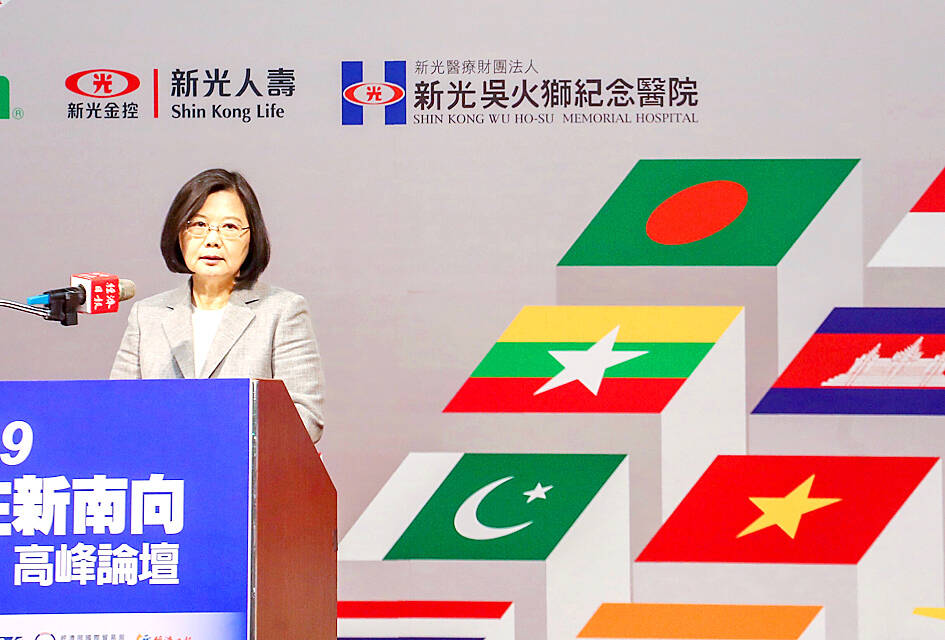The amount of approved outbound investments in countries under the government’s New Southbound Policy (NSP) accounted for more than 50 percent of the nation’s total approved outbound investments last month, the Ministry of Economic Affairs said on Saturday.
The New Southbound Policy aims to enhance trade and exchanges between Taiwan and 18 countries in Southeast and South Asia, as well as Australia and New Zealand, to reduce Taiwan's dependence on China. It was introduced after President Tsai Ing-wen (蔡英文) took office in 2016.
Data released by the ministry’s Department of Investment Review showed that the investments pledged by Taiwanese firms in the countries included in the policy totaled about NT$310 million (US$9.88 million) last month, up 29.97 percent from a year earlier.

Photo: CNA
The funds pledged for the countries made up about 57 percent of the total outbound funds — US$542 million — approved by the ministry last month.
Among the NSP countries, Vietnam, Thailand and Malaysia were the top three destinations for Taiwanese investors, the ministry said.
Last month, funds pledged for the Thai market jumped 243 percent from a year earlier to NT$49 million on the back of a large single investment plan worth NT$45 million, it said.
In contrast, approved investments bound for China fell 66.3 percent from a year earlier to US$95.61 million last month, it added.
The ministry said the support service industry in China, which includes travel agencies, attracted the largest amount of investments with a total of US$16.2 million from Taiwan last month, ahead of the electronics component sector with US$11.96 million.
Meanwhile, approved foreign direct investments last month hit US$684 million, up 134.62 percent from a year earlier, with the UK pledging the most investments at a total of US$325.81 million, ahead of Samoa (US$130.45 million), the ministry said.
Although investments in NSP countries rose, the approved investments in Taiwan pledged by these countries fell 83.21 percent from a year earlier to US$12.38 million last month, with Singapore, Australia and the Philippines being the largest investors, it said.
As for approved investments in Taiwan from China, the amount rose 245.72 percent from a year earlier to about US$3.05 million last month due to a relatively low comparison base last year, the ministry said.
The local wholesale and retail, electronic components and banking industries were the top three sectors to attract Chinese investors, it added.

Semiconductor shares in China surged yesterday after Reuters reported the US had ordered chipmaking giant Taiwan Semiconductor Manufacturing Co (TSMC, 台積電) to halt shipments of advanced chips to Chinese customers, which investors believe could accelerate Beijing’s self-reliance efforts. TSMC yesterday started to suspend shipments of certain sophisticated chips to some Chinese clients after receiving a letter from the US Department of Commerce imposing export restrictions on those products, Reuters reported on Sunday, citing an unnamed source. The US imposed export restrictions on TSMC’s 7-nanometer or more advanced designs, Reuters reported. Investors figured that would encourage authorities to support China’s industry and bought shares

TECH WAR CONTINUES: The suspension of TSMC AI chips and GPUs would be a heavy blow to China’s chip designers and would affect its competitive edge Taiwan Semiconductor Manufacturing Co (TSMC, 台積電), the world’s biggest contract chipmaker, is reportedly to halt supply of artificial intelligence (AI) chips and graphics processing units (GPUs) made on 7-nanometer or more advanced process technologies from next week in order to comply with US Department of Commerce rules. TSMC has sent e-mails to its Chinese AI customers, informing them about the suspension starting on Monday, Chinese online news outlet Ijiwei.com (愛集微) reported yesterday. The US Department of Commerce has not formally unveiled further semiconductor measures against China yet. “TSMC does not comment on market rumors. TSMC is a law-abiding company and we are

FLEXIBLE: Taiwan can develop its own ground station equipment, and has highly competitive manufacturers and suppliers with diversified production, the MOEA said The Ministry of Economic Affairs (MOEA) yesterday disputed reports that suppliers to US-based Space Exploration Technologies Corp (SpaceX) had been asked to move production out of Taiwan. Reuters had reported on Tuesday last week that Elon Musk-owned SpaceX had asked their manufacturers to produce outside of Taiwan given geopolitical risks and that at least one Taiwanese supplier had been pushed to relocate production to Vietnam. SpaceX’s requests place a renewed focus on the contentious relationship Musk has had with Taiwan, especially after he said last year that Taiwan is an “integral part” of China, sparking sharp criticism from Taiwanese authorities. The ministry said

US President Joe Biden’s administration is racing to complete CHIPS and Science Act agreements with companies such as Intel Corp and Samsung Electronics Co, aiming to shore up one of its signature initiatives before US president-elect Donald Trump enters the White House. The US Department of Commerce has allocated more than 90 percent of the US$39 billion in grants under the act, a landmark law enacted in 2022 designed to rebuild the domestic chip industry. However, the agency has only announced one binding agreement so far. The next two months would prove critical for more than 20 companies still in the process